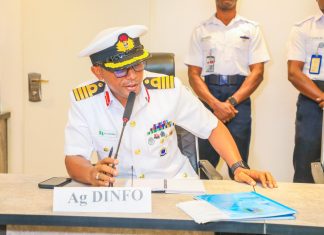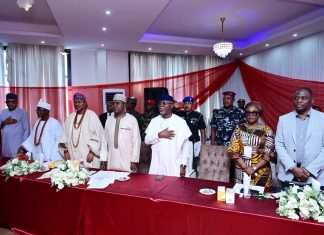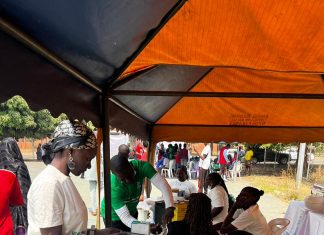The Senate has launched an investigation into irregularities in the awarding of contracts for shore erosion control work in Bayelsa state’s Akipelai, Ayakoro, and Otuoke.
Senator Matthew Urhoghide, chair of the Senate Public Accounts Committee, based the investigation on the 2017 Auditor General’s report, which was submitted to the Senate for consideration.
According to the Panel, the Contract was signed in March 2012, with a completion period of 14 months.
However, as of November, N4.2bn had been paid to the contractor, representing 56.61 percent of the contract sum.
However, a review of quantities (BOGs) under Attachment No. 1 revealed that the mobilization fee of N1.1bn paid to the contractor was supported by a conditional bank guarantee from Zenith Bank Plc with a validity period of 365 days that expired on March 2, 2013, in contravention of the provisions of Section 35 ‘1’ of the Procurement Act of 2007 and Financial Regulations 2933 “1” (2009), which only require the submission of an unconditional bank guarantee or insurance bond.
However, in a written response to the allegation, NPA claimed that en bloc recovery of the mobilization fee would place a financial strain on the project, necessitating the need to recover the fee piecemeal.
Read also:FAAN denies the theft of £400 allegation at Lagos Airport from Mr Olakunle Tayo Fapohunda
It was also revealed that N19.5 million was paid for a Toyota Hilux Double Cabin petrol engine, but there was no evidence to prove that these vehicles were purchased.
The NPA stated in its response to the allegation that the Toyota Hilux was purchased.
Another revelation by the Auditor General was that N128 million provided for insurance against damage to persons and property was certified and paid through certificate No-3 with no evidence that any insurance was taken out.
However, in its response, NPA stated, “Noted for future compliance.” The contractor carried out the required payment for work insurance to the tune of the approved amount.
“The contractor is usually in charge of the insurance details.”
Furthermore, the interim valuation certificate No. 4 dated November 11, 2015 stated that the value of works completed during the period was N3.9 billion, representing 52.07 percent.
However, the total amount paid to the contractor was N4.2 billion, representing 56.61 percent of the contract sum, implying that the contractor was paid N344 million more than the work performed.
The question states, “A contract for Shore Erosion Control Works at Akipelai, Ayakoro, and Otuoke towns in Bayelsa State was awarded at a contract sum of 7,503,344,599.00 (seven billion, five hundred and three million, three hundred and forty-four thousand, five hundred and ninety-nine naira), vide award letter Ref. No.: HQ/GME/CP/CON/R.16/067 dated
“As of 11th November, 2015, the contractor had received four (4) payment certificates and an advance payment totaling 4,247,938,353.26 (four billion, two hundred and forty-seven million, nine hundred and thirty-eight thousand, three hundred and fifty-three naira, twenty-six kobo), representing 56.61 percent of the contract sum.
“A review of the documents and Bill of Quantities (BOQs) under Bill No. 1 (General) attached to these payments revealed that: • The mobilization fee of 1,125,501,659.85 (one billion, one hundred and twenty-five million, five hundred and one thousand, six hundred and fifty-nine naira, eighty-five kobo) paid to the contractor was supported by a conditional bank guarantee from Zenith Bank Plc. with a validity period of
“More than four (four) years after the bank guarantee’s expiration, the contractor fails to renew it, and the balance of unrecovered advance payment stood at 539,452,959.95.” (Five hundred and thirty-nine million, four hundred and fifty-two thousand, nine hundred and fifty-nine naira, ninety-five kobo).
Read also: Nigeria’s attack has been dealt a double blow ahead of the Africa Cup of Nations finals in Cameroon
“A total of 19,500,000.00 (nineteen million, five hundred thousand naira) was paid for the purchase of three (3) Toyota Hilux double cabin petrol engine vehicles; however, there was no evidence to confirm that these vehicles were purchased.”
“A total of 13,500,000.00 (Thirteen million, five hundred thousand naira) was approved for the annual operating costs of the project vehicles, of which 6,750,000.00 (Six million, seven hundred and fifty thousand naira) was certified and paid to the contractor, but there was no evidence to show what the money was used for.”
“The sum of 11,250,000.00 (eleven million, two hundred and fifty thousand naira) certified for compensation of properties affected by the project and paid in Certificate No. 3 had no records on how the money was used or the beneficiaries involved.” • A payment of 12,000,000.00 (twelve million, five hundred thousand naira) was certified and paid via Certificate No. 3 with no supporting documents to validate the payment.
“128,000,000.00 (one hundred and twenty-eight million naira) provided for insurance of the works and insurance against damages to persons and property, was certified and paid through Certificate No. 3 with no evidence that any insurance policy(s) was undertaken.”
“According to the Principal Manager’s (QS) report on Interim Valuation Certificate No. 4 dated 11th November, 2015, the value of works completed as of the period was 3,903,668,868.75 (three billion, nine hundred and three million, six hundred and sixty-eight thousand, eight hundred and sixty-eight naira, seventy-five kobo), representing 52.07 percent of the contract sum.”
“However, the total payment made to the contractor was 4,247,938,353.26 (four billion, two hundred and forty-seven million, nine hundred and thirty-eight thousand, three hundred and fifty-three naira twenty-six kobo), or 56.61 percent of the contract sum. This implies that the contractor was paid more than the value of the work performed (344,269,484.51). (Three hundred and forty-four million, two hundred and sixty-nine thousand, four hundred and eighty-four naira, fifty-one kobo).
“During the project’s inspection, it was discovered that the contractor had since abandoned the project site, and the project’s duration had since lapsed without approval for its extension.”
NPA is expected to appear before the Committee to present an oral response to the query.
This is another opportunity to own a faster-loading website to expand your business and take it digitally online. Meet the best website designer/master coder for any kind of website. Contact them now it is affordable Chat now: 09077260922



















